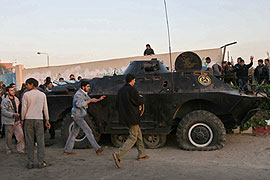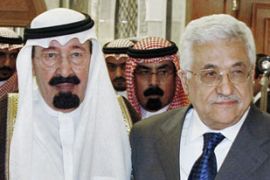The Quartet insists that for aid to resume, the Palestinian government must recognise Israel, renounce violence, and accept existing interim peace agreements.
Haniya, who is also a senior Hamas figure, said in a speech in Gaza city on Monday: “The American administration should reconsider its hasty position, which refuses to deal with the will of the Palestinian people.
“I say to the Quartet and to the European Union that this is the will of the Palestinian people, and they should respect it and they should work to end the status of siege.”
The unity agreement that Hamas signed with Fatah, led by Mahmoud Abbas, the Palestinian president, in Saudi Arabia last Thursday made no explicit commitment to recognise Israel.
A subsequent call by Abbas – in a letter to Haniya re-appointing him prime minister – urged Hamas to “abide by the interests of the Palestinian people” and “respect” past agreements and international law.
Israeli threat
Earlier on Monday, Israeli officials said that Israel was considering suspending contacts with Abbas if the unity government did not meet the Quartet’s demands.
Such a step would not only increase pressure on Abbas, but also hinder US efforts to revive long-stalled peace talks, beginning with plans by Condoleezza Rice, the US secretary of state, for a three-way summit with Abbas and Ehud Olmert, the Israeli prime minister, in Jerusalem on February 19.
However, Israeli officials said that a suspension of contacts may only be temporary and that a final decision will not be made until the Palestinian unity government is in place, a process that could take a month or longer.
Israel’s response also depended on whether Abbas and the new government could secure the release of captured Israeli soldier Gilad Shalit.
“Gilad Shalit can serve as a test,” Olmert said.
Key issues unresolved
Meanwhile in Gaza, Haniya cautioned that key issues remain unresolved despite the Mecca agreement.
 |
Fighting between Hamas and Fatah has left
more than 130 Palestinians dead [AFP] |
In a televised speech on Monday, he said his government will resign in the near future, a formality to allow appointment of the new unity government.
Under the Mecca pact, Hamas and Fatah have agreed to a division of cabinet positions, but have not yet decided who will get the key post of interior minister, controlling most security forces.
Factional violence has killed more than 130 Palestinians so far.
The unity deal also did not settle the fate of Hamas’s 5,600-strong Executive Force, which was formed last year over Abbas’ objections.
Haniya nevertheless said both sides were committed to implementing the Mecca accord.
He said “all Palestinians have won in this agreement”, adding that “when President Abu Mazen [Abbas] comes to Gaza, we will continue the negotiations on issues that remain.”

